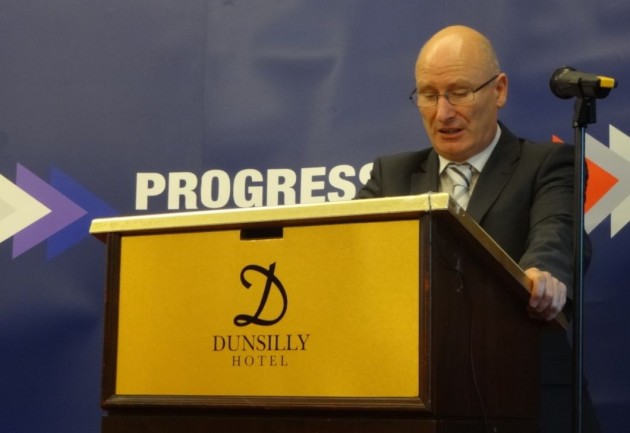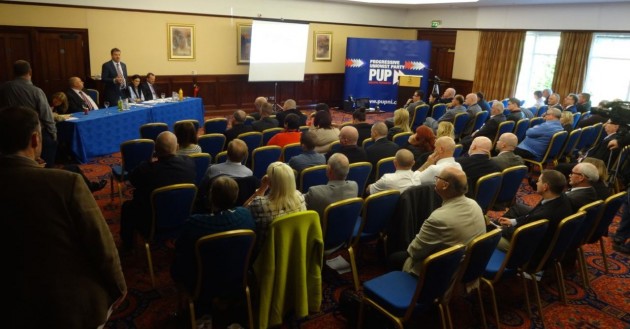 This year’s Progressive Unionist Party conference [party website down!] was held in the Dunsilly Hotel outside Antrim. About 80 delegates were present, around 40% were women, some of whom were obviously now making a big impact on party policy and direction. The audience seemed a little younger than previous years. It was good to see the party open to listening to critical friends during the panel discussion.
This year’s Progressive Unionist Party conference [party website down!] was held in the Dunsilly Hotel outside Antrim. About 80 delegates were present, around 40% were women, some of whom were obviously now making a big impact on party policy and direction. The audience seemed a little younger than previous years. It was good to see the party open to listening to critical friends during the panel discussion.
In the morning Councillors Julie-Anne Corr and Russell Watton addressed conference and six motions were proposed, debated and passed:
- party membership;
- need for a culture awareness programme defining Protestant, unionist and loyalist identity;
- supporting women’s full and equal political participation in the political process, calling for the implementation of UN Security Council resolution 1325;
- reform of animal welfare and enforcement of Welfare of Animals Act 2011;
- protecting the NHS; and
- calling for abolition of zero hour contracts.
After lunch the eighty delegates returned to the conference room to watch a twenty minute video produced on 20 Years of the Loyalist Ceasefire produced by Jonathan Hodges to capture the memories and analysis of those involved from the PUP. If it appears online I’ll add a link.
Then it was the turn of guest academic and author Stephen Baker to address the conference. He’s a co-author of The Propaganda of Peace: The Role of Media and Culture in the Northern Ireland Peace Process (a book mentioned on Slugger back in 2010).
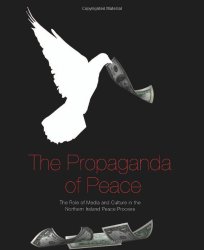 The ceasefires were both a relief and an opportunity for society and held out the possibility that NI could have a representative democracy with human rights at its heart, economic renewal and no need to return to violence. But looking back twenty years, Stephen Baker suggested that our politics have become increasingly sterile with politicians focussed on a narrow band of issues that they’re practiced at arguing.
The ceasefires were both a relief and an opportunity for society and held out the possibility that NI could have a representative democracy with human rights at its heart, economic renewal and no need to return to violence. But looking back twenty years, Stephen Baker suggested that our politics have become increasingly sterile with politicians focussed on a narrow band of issues that they’re practiced at arguing.
Northern Ireland has been rebranding itself as “open for business” in order to attract economic success and investment. This parallels Tony Blair’s desire when he came to power with New Labour to rebrand the UK’s global image: yet Cool Britannia was “a triumph of style over substance”.
Have the changes in NI been too cosmetic? Millions of pounds spent to attract global media events to NI – for example MTV European Music Awards (with £1m in funding and a £20m return to the economy), the G8 Summit, Game of Thrones – with the aim of capturing the attention of tourist holiday makers and inward investors.
There’s a promise of jobs and property. Millions “pumped into the economy” … but what’s the quality of the jobs that have been created?
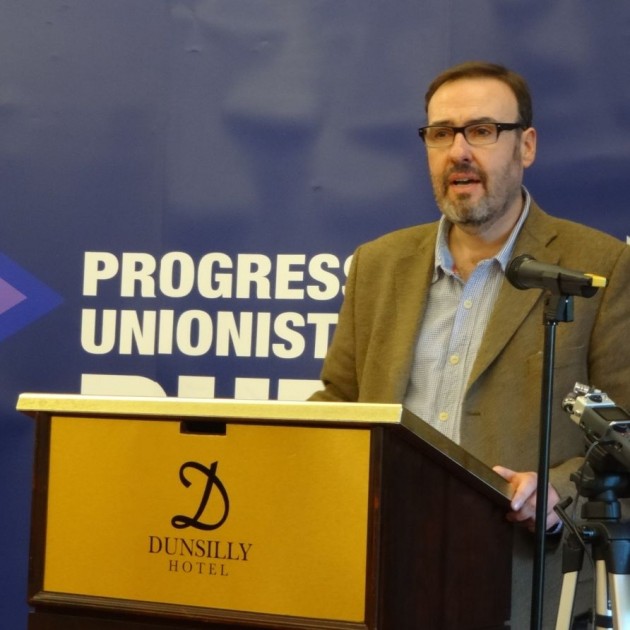 Stephen Baker could see no explanation about how any of the economic impact figures are arrived at, or detail about exactly where the money goes. Does any end up in working class areas or tackling poverty?
Stephen Baker could see no explanation about how any of the economic impact figures are arrived at, or detail about exactly where the money goes. Does any end up in working class areas or tackling poverty?
The branding and investment depends on good political behaviour. No matter the provocation, communities are obliged to keep their mouths shut about it in order to preserve the image.
This week, it has been suggested that protesters could be made to cover the cost of policing protests. Stephen argued that charging people for the protest has implications beyond loyalism.
That elected reps are seriously entertaining that democratic protest should be based on our ability to pay is ridiculous.
Over recent years, DSD has spent £8.2 million on fake shop fronts which the minister suggested “enhanced shopper experience” … though more shops might have been better. Papering over economic problems and whitewashing our troublesome politics to make us competitive in the global economy. Cultural expression only welcomed “if it turns a profit”. Stephen finished:
Twenty years ago the ceasefires created an historic opportunity for political debate and democratic arrangements to take the place of guns and bombs in Northern Ireland. Twenty years later it is incumbent upon all of us to make sure that it is political debate, the democratic process – and yes, protest, when necessary – that informs decision makers, and not merely the whims of the free-market.
While Stephen referenced issues of culture and protests which resonated with the PUP delegates, his mentions of the problems of racism and community cohesion are ones that I don’t often hear the PUP speaking out on. Though Billy Hutchinson defended the party’s record when I interviewed him after the conference.
A panel discussion brought together critical friends and commentators – Eamonn Mallie, Stephen Baker (chair), Aaron Edwards, John Brewer and Chris Hudson – along with party leader Billy Hutchinson to talk about the loyalist ceasefire, and the challenges facing loyalism. (It’s in two parts: firstly the opening contributions from the panel; and then the Q&A from the floor.)
Party leader Billy Hutchinson explained the circumstances which had made the ceasefires possible. Starting by saying that he’s reached the age at which he now speaks his mind, veteran journalist Eamonn Mallie picked up on Stephen Baker’s earlier talk and criticised the “phoney film industry” which was providing few jobs for Belfast. He accused film companies of bringing in coffee from London to the film sets, and said that executives preferred to spend their weekends in London and Dublin rather than Northern Ireland.
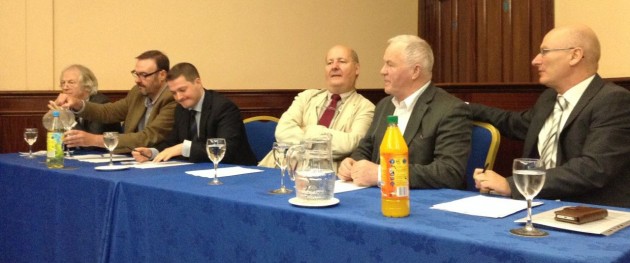 Rev Chris Hudson (formerly a trade-unionist in Dublin and now a cleric in Belfast who acted as a channel between loyalist paramilitaries and the Dublin government) challenged the PUP delegates to consider a civic unionism that was at ease with people playing GAA or speaking Irish. He spoke of bravery in Afghanistan and hoped that any Afghanis coming to live in Belfast would receive a warm welcome. Historian Aaron Edwards started by relating his journey from Rathcoole to academia.
Rev Chris Hudson (formerly a trade-unionist in Dublin and now a cleric in Belfast who acted as a channel between loyalist paramilitaries and the Dublin government) challenged the PUP delegates to consider a civic unionism that was at ease with people playing GAA or speaking Irish. He spoke of bravery in Afghanistan and hoped that any Afghanis coming to live in Belfast would receive a warm welcome. Historian Aaron Edwards started by relating his journey from Rathcoole to academia.
John Brewer said that the loyalist ceasefire had been exceptionally important and asked the delegates whether the same situation was possible today. Twenty or more years ago there was a clear framework of who in loyalism to approach to engage with. Intermediaries like Roy Magee, Chris Hudson and Robin Eames and could converse with the Combined Loyalist Military Command. Back then there was also a moral framework – of Christian socialism and class – that provided hope.
John Brewer challenged the PUP:
Are you focussed enough on class politics? … What loyalism needs is a Protestant Sinn Féin, a party that can deal with national issues but at the same time get your drains sorted out and deal with flooding. Are we pushing grass roots politics? How are we responding to the level of disappointment and disillusion with the peace process? We’ve got not just low expectations, but no expectations.
When the panel discussion was opened up to the floor, media portrayal of party representatives and loyalism in general quickly became a sustained talking point. At one point Eamonn Mallie asked “Who is the clown?” at next week’s “circus” talks?
From the floor, Brian Ervine reminded delegates of his brother David’s phrase “violence is the last resort of despair”. He spoke against examples he perceived as media bias against loyalists and was angry that the portrayal of urination and the Famine Song at the Covenant parade totally eclipsed an otherwise peaceful and huge parade. He finished by repeating “violence is the last resort of despair” and got a loud round of applause.
Billy Hutchinson was delivering his fourth speech as party leader, having taken over in October 2011. It was significantly shorter than Billy’s normal conference addresses which have tended to lurch off the printed page into off the cuff monologues. Instead, this year’s twenty minute message was well written, concise and a big improvement. If only it had been made at lunchtime when some of the news crews could have captured its delivery.
He began by stating that October 1994 “was not the beginning of Loyalist involvement in the process but the culmination of it” and told delegates that “the 1991 ceasefire is much overlooked [and] pertinent in that it demonstrated the desire for an exploration of a possible end to conflict”.
Unrecognised for its efforts; eternal analysis has singularly failed to appreciate the depth of loyalist achievement … Loyalism is written out of recent history.
Billy called a United Ireland “a fantasy” and “a Gaelic myth nowhere to be found on the real-life agenda of these island’s relationships”.
Sinn Féin’s abject failure to achieve their singular objective has given birth to an ugly campaign of cultural warfare.
He added:
Unwittingly aided by those who refuse to learn from history, Sinn Féin today wave the ballot box with one hand and whisper the threat of dissidents behind the other.
We remain committed to the defence of British rights and to robustly opposing those who would deny those rights … This party remains committed to our role within the combined Unionist Leadership – on the North Belfast impasse, on parades in general and on matters of mutual Unionist interest.
The “North Belfast situation” was “illustrative of this country’s major problems and integral to overcoming them”. The “plight of the Ligoneil bands and brethren remains at the very core of the political process”.
The PUP has not been invited to the Secretary of State’s talks. Billy announced the PUP’s support for an official opposition at the Assembly:
The convoluted framework that forced mandatory coalition was an emergency measure, agreed to achieve political stability but always expected to evolve in the interests of good governance …
We sought a system that shared the responsibility of good governance toward a common vision; we ended up with a system where power is carved up and bad governance too often the result competing and conflicting visions.
It is time to move on … This is not some lurch to the past or nostalgic yearning for the return to a one party state. That is not what we are about. This party is founded on inclusion – socially and politically.
We fully accept the unique difficulties of our region and recognise that they need to be accommodated in the structure of government. But the current system is neither fit for purpose nor delivering for the people of this country.
Today I submit our support for the creation of an official opposition. A voluntary coalition, by way of weighted majority, can satisfy the historic concerns of nationalism but allow a government based on shared vision rather than electoral default.
It would encourage a programme for government free from the terminal ambivalence that has dogged progress and hampered delivery. A government audited by the scrutiny of an official opposition, divested with the facilities and resources to hold government to account and to expose those not fit for the task, or not committed to the challenge.
The PUP’s was against the welfare cuts, but was also critical of Sinn Féin’s handling of the issue:
This party is opposed by ideology and principle to welfare cuts .. This conference … passed a motion against the current welfare reform two years ago. We reinforced that view in debate last year also.
But what we oppose as vociferously is narrow party political posturing that puts at risk, not only this society’s most vulnerable but also the whole fabric of government. What we oppose as vociferously is playing the politics of another jurisdiction and the holding to ransom [by Sinn Féin] of our political system for the veneer of consistency elsewhere.
Our Executive parties, as dysfunctional and myopic as they are, have been tasked with the privilege of governing this country. They have a democratic and moral imperative to get on with that task. What we need to see, and quickly, are those whose job it is to govern – to do that job and govern!
And what they need to do is prove that this megaphone diplomacy on welfare reform and its impact on the budget is not empty bluster. They need to get on with the task of government with a focus on protecting the vulnerable. They need to travel to the margins of society and ensure, by way of efficiencies and imagination, that the safety net, so integral to our British identity, does not give way. They need to maintain a focus on those whose daily struggle is far removed from the abstract squabbles of Stormont.
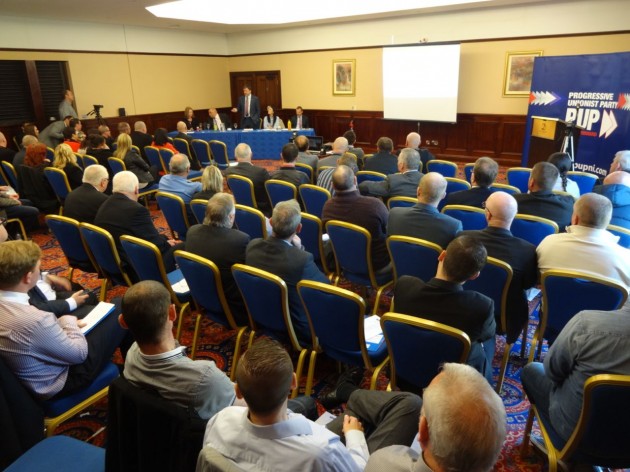 Billy Hutchinson called for government to “set in place a system of case studies” to track the “coal face effect of welfare reform on this society’s most vulnerable” … “a consistent and thorough examination of its real impact on real people”.
Billy Hutchinson called for government to “set in place a system of case studies” to track the “coal face effect of welfare reform on this society’s most vulnerable” … “a consistent and thorough examination of its real impact on real people”.
Over an 18 month period, he believed case studies would “give us the clearest picture of where we are failing those at the margins of society” allowing action (rather than just words) to be taken to tailor policies.
He also compared the estimated £1 billion of benefit fraud with the £70 billion of tax avoidance.
Billy Hutchinson described the education system as “very clearly broken”.
We still ask children with a reading age of 9 to sit a transfer test drafted for 11 year olds and then wonder why their results are less than average.
A transfer test that recognises capacity in its narrowest sense yet determines the course of our young people’s future, long before they are able to cope with a reckoning of such magnitude.
The party leader suggested “incentivising our brightest teachers to teach at our worst performing schools” as well as “fast tracking recognition of excellence for those [schools] who have turned the curve of underperformance”.
Citing recent job loss announcements at JTI Gallaher and Bombardier, Billy Hutchinson stated that Northern Ireland’s “manufacturing base is under threat”.
Instead of lusting after the white elephant of lower corporation tax, Government would be best served helping those businesses already here, instead of a dubious and costly gamble on those who may never come.
We need to help small local business, fill in their gaps in expertise and knowledge, feed them with the information and assistance required to grow … identify key areas in disadvantaged communities and invigorate them with enterprise ones to bring employment to suit all levels … a forward thinking government able to overcome big challenges with big ideas and big decisions.
He echoed PUP councillor Julie-Anne Corr’s comments earlier in the day about the PUP being “a forward-thinking forward-moving political vehicle” and thanked “party members and activists who are the engine of this vehicle”.
Commenting on local government electoral success:
For this is not about elections. Elected office is for us, a means to an end. We exist to help and inspire our communities, but can do so better with the levers of electoral influence.
We can bring more change, then more office, then deeper change, then further office … Together let’s complete this journey.
After the close of the conference I asked party leader Billy Hutchinson about his vision for the party and Northern Ireland. We also discussed post-primary testing, the impact of the Scottish referendum, the party’s approach to racism and whether he saw merit in reaching out to pro-union Catholic working class voters (in the same way Peter Robinson routinely extends a shaky olive branch in his party conference speeches).
Alan Meban. Tweets as @alaninbelfast. Blogs about cinema and theatre over at Alan in Belfast. A freelancer who writes about, reports from, live-tweets and live-streams civic, academic and political events and conferences. He delivers social media training/coaching; produces podcasts and radio programmes; is a FactCheckNI director; a member of Ofcom’s Advisory Committee for Northern Ireland; and a member of the Corrymeela Community.
Discover more from Slugger O'Toole
Subscribe to get the latest posts to your email.

